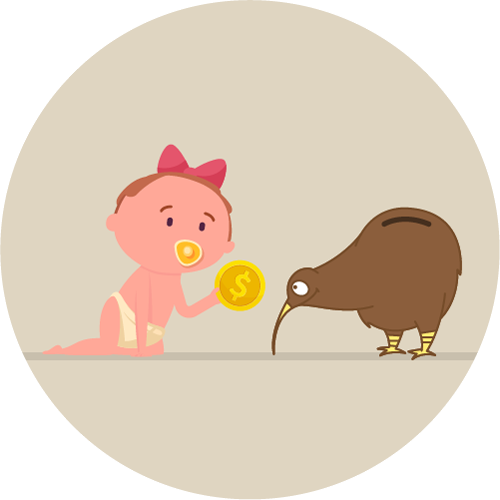The Life Cycle of an Investor
May 10, 2020
People are confused about what to do with money, particularly at the moment and I’ve spent many a happy hour answering emails to try to resolve this confusion.
And I’ve come up with a theory. Stay with me here…
We spend years cobbling together our financial lives and each time something new crops up we tack it on to our finances; Tertiary study, Student debt, Overseas travel, Buying a house, Updating a car
We just tack each new event onto our own personal financial system, often before we have even finished off the last event. The problem arises when we have made far too many additions to our personal financial system, thereby weakening the overall structure and more often than not, inevitably something has to give and the system starts to collapse.
And more often than not we don’t have an understanding of the basics like “live on less than you make” so we start to weaken our financial structure even more by turning to debt to prop it up. A lot of these weaknesses can be patched over, e.g. a rental property can look sustainable because of capital gains or a credit card might seem Ok because you are meeting minimum payments but it’s when there is a system reset like we are seeing at the moment with COVID-19 that our personal financial structure starts to creak and groan.
Many emails I receive focus on one specific part of the puzzle that they are having an issue with, but they allude to other parts of the person’s financial life. When I read these emails the word that always comes to my mind is - Synergy: the whole is greater than the sum of its parts.
You can’t cherry-pick one component and disregard the other, because everything is intertwined and everything has to work together and create synergy, otherwise, you are just bolting on bits to your shaky financial structure without regard for the bits that are already there.
An example of this is investing when you have consumer debt.
Growing up I was often told that I was “practical” and that I saw things as “black or white” and this was often seen as problematic, but I disagree (I was always opinionated too). Sometimes I think we need to just be completely blunt instead of fluffing around. An example of this is me saying to someone who is struggling with living on less than they make is “stop wasting money on takeout, cook at home, that’s why you have a kitchen for god’s sake” instead of saying “if you are struggling financially, maybe consider eating out less”. I like to be quite clear if I can.
So, today, I have created an overly simplified and pretty straight forward life plan to follow, because there are key milestones in life where many of us do exactly the same thing and my thoughts are that we know what’s coming up, so why not plan for it?
This is a blog on:
Timelines and learning the art of patience
Of not putting the cart before the horse
Of not running before you can walk
Of not bailing out a boat and neglecting to fix the hole
And mainly it’s about simplicity and getting the basics right when it comes to money so that you use it and it doesn’t use you.
In the ideal world, if we all thought ahead a little more then we wouldn’t run into so many money troubles. And if we do still run into troubles, we are more likely to be in a more educated position to cope with them and move on quickly.
I’m sure that many of you will read the information below and be muttering “But my situation is different…” However, my observation, when it comes to money, is that it’s rare for any of us to be THE exception to the rule, yes we may execute things differently but by and large, when you pare life back to the basics, we all tend to follow roughly the same path.
Enjoy!
The Life Cycle of an Investor:
From Birth to Freedom
The journey begins…
BIRTH
Start KiwiSaver immediately
$40 per month into a low fee growth fund in your child’s name
The sooner you start, the more you will have at 65 because it will compound over time
⇣
Parents you may also want to begin putting aside $20 a week (into a bank account or index fund) for future schooling and expenses (sport, computers, dentistry)
Kids are expensive and are in your care for about 18 years!
EARLY YEARS
For every $10 received for ANY reason, teach your child to always save $5
Form a saving habit young because it’s hard to learn it later
⇣
With $5 invest in one or two index funds for future use
A part of all you earn is yours to keep
⇣
They can spend the other $5 freely because they have already saved for their future
Encourage them to start a sinking fund to save for the bigger things they want e.g. soft toy
TEENAGE YEARS
Get your first real job
Learn to budget your income
⇣
Pay 3% into KiwiSaver from your wages
Pay 47% of your pay into your index funds
= 50% savings rate
⇣
With the remaining 50% use sinking funds to save up for things
e.g. first car
And spend the rest freely
⇣
Price up the cost of tertiary education OR the cost of a house
Investing with this goal in mind
⇣
Learn to plan ahead
Learn to pay with cash and not debt
⇣
Learn to spend some, save some, share some
LEAVE HOME
Tertiary Education OR Full Time Work?
Tertiary Education
Build up an emergency fund of $1,000 and keep this in your bank
⇣
The first year of tuition is free
Use the money saved in your index funds to pay your way
Pay cash for everything - avoid student loans/debt
⇣
Do not get a credit card or overdraft
⇣
Get a part-time job during term time and a full-time job every holiday
Study hard, work hard, play hard
⇣
Avoid lifestyle creep because you are a student
This season of life is short so toughen up
⇣
Budget your money extremely carefully
This is not the time to invest in anything other than KiwiSaver and getting through your study debt free
⇣
Parents may stop $40 month into KiwiSaver when you turn 18
You contribute $40 a month yourself or 3% from your wages
You will now receive a government top-up each year once you invest $1042
OR
Full Time Work
Go and get a full-time job
⇣
Pay 3% into your KiwiSaver and never stop - this money is for retirement only
⇣
Pay 47% of your take-home pay into your index funds and this is now your future house deposit starting to grow
⇣
Create an emergency fund of three months expenses and keep this in your bank
⇣
Avoid lifestyle creep
⇣
Budget your remaining 50% of your take home pay to cover daily expenses
Pay into sinking funds for specific things (an overseas trip)
Give every dollar a purpose
EARLY 20’S
Finished study?
⇣
Get a full-time job
⇣
Pay 3% of your wage into your KiwiSaver and never stop - this is for retirement only
⇣
IF you have a student loan. Aggressively pay this off with 47% of your salary until its gone. Be relentless and focus on becoming debt-free fast
⇣
Once debt free pay this 47% of your takehome pay into your index funds
This is now your future house deposit starting to grow
⇣
Budget your remaining wage and pay cash for daily expenses
Pay into a sinking fund for specific things (an overseas holiday or a new sofa)
Give every dollar a purpose
⇣
Live on less than you make
Work hard
Have fun
Avoid debt because it will trap you
Create sinking funds. Want a holiday? Save up for it
Need money? Earn more
Don’t ever get a credit card, get a debit card instead
Keep the way you structure your money simple
Be generous with your time
LATE 20’S - EARLY 30’S
Buy a house if you want to
⇣
Use the money invested in index funds to put the largest deposit on the cheapest house
⇣
Have an emergency fund of 3-6 months expenses at all times from now on
It turns an emergency into an inconvenience
⇣
Pay 47% (more if you can spare it) of your takehome pay towards your mortgage
Become mortgage free ASAP
Be focussed, disciplined and driven
⇣
Pay 3% in your KiwiSaver
⇣
With your remaining pay, budget for upcoming expenses and always pay cash
Use sinking funds to save up and pay cash for larger expenses
⇣
Be generous with your time
LATE 30’S - EARLY 40’S
Debt-free
⇣
Congratulations!
⇣
Pay 3% into your KiwiSaver
⇣
Pay 47% into index funds on a monthly basis without ceasing
⇣
With your remaining pay, budget for upcoming expenses and always pay cash
Use sinking funds to save up and pay cash for larger expenses
⇣
Enjoy life but avoid lifestyle creep
⇣
Control your needs and build your assets
FINANCIAL INDEPENDENCE
Congratulations!
⇣
Pay 3% into KiwiSaver
⇣
Have an emergency fund of 3-6 months of expenses
⇣
Invest in your index funds on a monthly basis
⇣
Be generous with both your time and money
⇣
Once you have saved and invested x25 your annual expenses you have reached financial independence
Congratulations!
⇣
Work is now optional, irrespective of your age
⇣
You can continue to work or you can begin to draw down on your investments at 4% per year
⇣
When you finally turn 65 you can go ahead and access a lifetimes investment into KiwiSaver
⇣
Enjoy your FREEDOM
Additional Notes:
When I say “pay cash” I don’t mean literally cash, I mean using your own money and not debt.
A sinking fund is a savings goal. If you want to buy an item worth $500 in 12 months (52 weeks) time you would save $9.61 each week to meet this goal. You can have several of these funds at a time and they teach you to plan ahead.
If your employer is offering to match more than 3% in KiwiSaver, take it.
Budget and give every dollar a purpose, otherwise you will fritter it away. A budget gives your permission to spend.
Throughout your lifetime check in on your KiwiSaver to make sure its the right low fee fund for your stage of life.
Avoid thinking you know more than you do. Educate yourself.
My golden rule: Don’t take financial advice off people who have no money.












